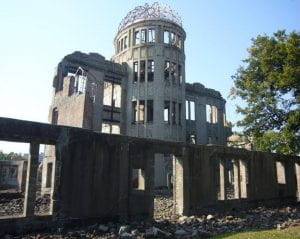Hello and welcome back to my blog. Today we will be talking about WW2 and the Hiroshima bombing. Or at least what I learned about them. In order to share my learning I made my next podcast episode about WW2 all in order to answer the driving question:
How might we use stories to understand the causes and consequences of WW2?
This project was a series of ups and downs mainly because of how large scale the event was, and the delicacy needed in order to talk about WW2 as a subject. The first thing i needed was information. Ignorance may be bliss but knowledge is power. I decided to learn more about the Hiroshima bombing for 2 reasons. The first is that I am Japanese and I thought that I might be able to provide some insight into how it has a lasting effect until today. The second reason is that I have been to the Hiroshima bombing museum as well as the Gen Baku Dome pictured below.
The second thing I needed was an interview, or a story. I did contact a couple of people but to no avail, and needed up using an oral story from the national museum of the Pacific war. Here I learned about a man named Kenneth Evans who served in the war. I also got a interview with Japanese teacher, who grew up in Hiroshima. This interview was really insightful into learning how the bombing effects people who live in the area and what people think about the effects.
One thing that I really enjoyed about this project was learning about stories people wrote about war. One in particular called the “War Prayer” by Mark Twain. This short story was about the 2 sides of war. The honour that it can bring to your country and the devastation the fighting can bring.
Finally I recorded my podcast and published it. I published it to a site called anchor which automatically sends it to other platforms such as Spotify and Apple Music. You can check out my podcast here.
Conclusion
This project was really an eye opener and helped me understand how tragic the war was. It also puts into perspective the fact that, even though there were so many deaths in the Hiroshima bombing it was still only one incident in the larger scale of the war. Hearing the bombing from different perspectives allows me to understand the diverse opinions and consensus on the topic. In conclusion my answer to the driving question would be; that there are emotional consequences that last within the Japanese people until today. Being able to remember these tragedies and learn from them so they are not repeated.
